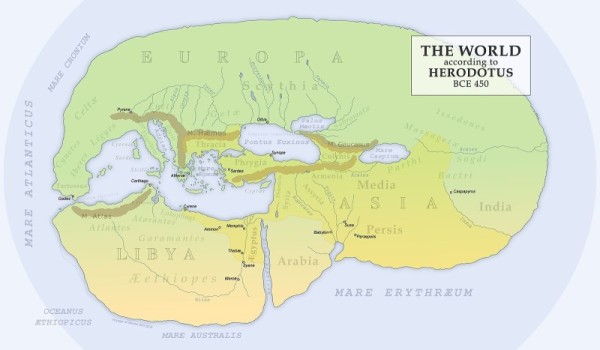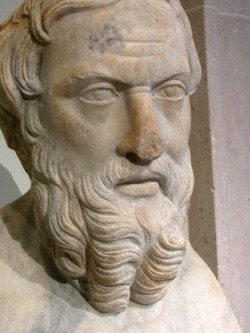Then Amasis, when he had read the paper which had come from Polycrates, perceived that it was impossible for man to rescue man from the event which was to come to pass . . . .

Translated by George C. Macaulay — our special project presenting the complete Herodotus with URLs for all of those people, places, events, and things which baffles and discourages modern readers.
Previously on Herodotus
42. But on the fifth or sixth day after these things it happened to him as follows: — a fisherman having caught a large and beautiful fish, thought it right that this should be given as a gift to Polycrates. He bore it therefore to the door of the palace and said that he desired to come into the presence of Polycrates, and when he had obtained this he gave him the fish, saying: “O king, having taken this fish I did not think fit to bear it to the market, although I am one who lives by the labour of his hands; but it seemed to me that it was worthy of thee and of thy monarchy: therefore I bring it and present it to thee.” He then, being pleased at the words spoken, answered thus: “Thou didst exceedingly well, and double thanks are due to thee, for thy words and also for thy gift; and we invite thee to come to dinner.” The fisherman then, thinking this a great thing, went away to this house; and the servants as they were cutting up the fish found in its belly the signet-ring of Polycrates. Then as soon as they had seen it and taken it up, they bore it rejoicing to Polycrates, and giving him the signet-ring they told him in what manner it had been found: and he perceiving that the matter was of God, wrote upon paper all that he had done and all that had happened to him, and having written he dispatched it to Egypt.
43. Then Amasis, when he had read the paper which had come from Polycrates, perceived that it was impossible for man to rescue man from the event which was to come to pass, and that Polycrates was destined not to have a good end, being prosperous in all things, seeing that he found again even that which he cast away. Therefore he sent an envoy to him in Samos and said that he broke off the guest- friendship; and this he did lest when a fearful and great mishap befell Polycrates, he might himself be grieved in his soul as for a man who was his guest.
44. It was this Polycrates then, prosperous in all things, against whom the Lacedemonians were making an expedition, being invited by those Samians who afterwards settled at Kydonia in Crete, to come to their assistance. Now Polycrates had sent an envoy to Cambyses the son of Cyrus without the knowledge of the Samians, as he was gathering an army to go against Egypt, and had asked him to send to him in Samos and to ask for an armed force. So Cambyses hearing this very readily sent to Samos to ask Polycrates to send a naval force with him against Egypt: and Polycrates selected of the citizens those whom he most suspected of desiring to rise against him and sent them away in forty triremes, charging Cambyses not to send them back.
45. Now some say that those of the Samians who were sent away by Polycrates never reached Egypt, but when they arrived on their voyage at Carpathos, they considered with themselves, and resolved not to sail on any further: others say that they reached Egypt and being kept under guard there, they made their escape from thence. Then, as they were sailing in to Samos, Polycrates encountered them with ships and engaged battle with them; and those who were returning home had the better and landed in the island; but having fought a land-battle in the island, they were worsted, and so sailed to Lacedemon. Some however say that those from Egypt defeated Polycrates in the battle; but this in my opinion is not correct, for there would have been no need for them to invite the assistance of the Lacedemonians if they had been able by themselves to bring Polycrates to terms. Moreover, it is not reasonable either, seeing that he had foreign mercenaries and native archers very many in number, to suppose that he was worsted by the returning Samians, who were but few. Then Polycrates gathered together the children and wives of his subjects and confined them in the ship- sheds, keeping them ready so that, if it should prove that his subjects deserted to the side of the returning exiles, he might burn them with the sheds.

CC BY-SA 2.0 image from Wikipedia.
46. When those of the Samians who had been driven out by Polycrates reached Sparta, they were introduced before the magistrates and spoke at length, being urgent in their request. The magistrates however at the first introduction replied that they had forgotten the things which had been spoken at the beginning, and did not understand those which were spoken at the end. After this they were introduced a second time, and bringing with them a bag they said nothing else but this, namely that the bag was in want of meal; to which the others replied that they had overdone it with the bag. However, they resolved to help them.
47. Then the Lacedemonians prepared a force and made expedition to Samos, in repayment of former services, as the Samians say, because the Samians had first helped them with ships against the Messenians; but the Lacedemonians say that they made the expedition not so much from desire to help the Samians at their request, as to take vengeance on their own behalf for the robbery of the mixing-bowl which they had been bearing as a gift to Croesus, and of the corslet which Amasis the king of Egypt had sent as a gift to them; for the Samians had carried off the corslet also in the year before they took the bowl; and it was of linen with many figures woven into it and embroidered with gold and with cotton; and each thread of this corslet is worthy of admiration, for that being itself fine it has in it three hundred and sixty fibres, all plain to view. Such another as this moreover is that which Amasis dedicated as an offering to Athene at Lindos.
– Herodotus, Book III
| <—Previous | Master List | Next—> |
Herodotus made his living by being interesting. In a world where most people did not read and could not afford to buy a book even if they could, they would pay to listen to Herodotus recite from his books. They would not pay to be bored. In that world, the names that populate his stories would have some general familiarity to his audience. Their obscurity to us is a barrier that this series seeks to break down.
MORE INFORMATION
MAP LIBRARY
Because of lack of detail in maps as embedded images, we are providing links instead, enabling readers to view them full screen.

Leave a Reply
You must be logged in to post a comment.